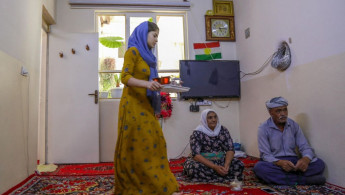Hopes languish for Kurdish refugees in Iraq watching Iran vote
Stuck in Iraq for decades due to a lack of documents, Kurdish refugees from neighbouring Iran are watching elections in the Islamic republic this week with little hope for change.
One of them, Behzad Mahmoudi, died after setting himself on fire last month in front of a UN office in Erbil, the capital of autonomous Iraqi Kurdistan.
His death put the spotlight on the plight of the refugees in Iraqi limbo.
"The UN doesn't want to see us or hear our problems," said Ashkan Mirani, an Iranian Kurd in a United Nations refugee camp outside Erbil.
Four months ago, Mirani decided to leave for Europe with his pregnant wife and four-year-old daughter.
They were smuggled from Iraq into Turkey, where they boarded a boat in the Black Sea with around 120 other would-be migrants.
"After one hour on the boat, strong waves started hitting us. We all thought we were going to die," said the 30-year-old.
"Thanks to the Afghan refugees who called the Turkish coastguard... they came to our rescue."
A decade ago, Mirani joined a Kurdish opposition party in Iran, hoping to improve the lives of his people.
But life there "is unbearable and unliveable due to economic and political hardship," he said.
"And here... I can't promise my family that tomorrow will be any better than today. The only solution I can think of is to try to reach Europe once again."
Today, he struggles each day to feed for his children -- a task the UN says is twice as difficult for refugees as for citizens of Iraq, whose lives have been battered by decades of war and the Covid-19 pandemic.
Baghdad refuses to grant citizenship to Iranian refugees, even those who have been living in the country for more than 40 years.
Until 2003, under late dictator Saddam Hussein, there were 16,000 Kurdish refugees living in Iraq, the UN says. There are now more than 10,700, the vast majority in Iraqi Kurdistan.
Arbil only grants them residency permits allowing them to work and travel within the autonomous region's three provinces if they can find a guarantor. Baghdad does not recognise their validity.
That means the only way out for them is to obtain asylum in a third country -- but few applications are accepted by the UN High Commissioner for Refugees.
Sawen Goran, 29, was born in Arbil after her parents emigrated from Iran.
"My father died without being able to return to Iran," she told AFP. "I'm afraid that one day my kids will say the same thing about their mother and father."
But she cannot envisage moving to her homeland without a change of regime.
And with ultraconservative, Ebrahim Raisi, seen as the frontrunner in Friday's Iranian presidential election, Moustafa Ibrahim and his wife Fatima Pirozee are downbeat about the result.
"I have zero faith in the Iranian presidential elections," said Ibrahim, 67, who has been a political refugee in Iraq for 40 years.
"The candidates are the faces of the same coin. Nothing will change. In Iran, elections after elections, conditions only get worse."
At one point eight years ago, Ibrahim said he believed change was possible, when then-candidate Hassan Rouhani promised to include Kurdish in the school curriculum and help develop Kurdish regions.
But Ibrahim said that once Rouhani became president, nothing was done.
His wife, 60, is more concerned about current negotiations on Iran's nuclear programme.
"The Iranian regime will oppress their people more if the economic sanctions are lifted," she said.
"More money for the Iranian regime means more support to the Iranian proxy militias in the region."





 Follow the Middle East's top stories in English at The New Arab on Google News
Follow the Middle East's top stories in English at The New Arab on Google News


